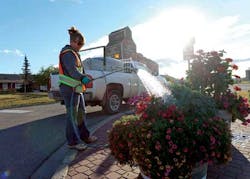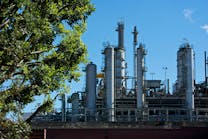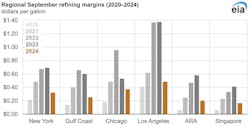Shell, City of Dawson Creek partner to conserve water in British Columbia
The city of Dawson Creek, 740 miles northeast of Vancouver, sits in the heart of British Columbia's natural gas and oil producing fields, and is now a partner with Europe's largest oil company, Shell.
On September 7, the city, together with Shell, celebrated the opening of the Dawson Creek Reclaimed Water Project. The facility, process and associated infrastructure will virtually eliminate Shell's need to draw on local fresh water sources for the operation of its natural gas venture in Northeast British Columbia. The company is now using the City of Dawson Creek's wastewater to supplement its recycled water for drilling and hydraulic fracturing operations in the Groundbirch natural gas fields.
Hydraulic fracturing of natural gas wells requires large quantities of water, and Shell has been committed to minimizing the amount of fresh water it uses in drilling and completions. The multi-million dollar facility will not only reduce Shell's fresh water draw, but it will provide a new source of revenue for the City of Dawson Creek as well as additional water for industrial and municipal uses.
With a capacity of 4,000 cubic meters a day, enough water for over 12,000 Canadian households, the plant will treat sewage waste-water currently released into the Dawson Creek. Shell will pipe its share of the water from the plant to its Groundbirch natural gas field it operates roughly 30 miles west of Dawson Creek, while the local municipality will use the water for such projects as road cleaning and field watering.
Shell will pipe the water from the treatment plant to the Groundbirch area and store it in ponds and later mix it with recycled production water to be used in drilling and well completions. Piping the water to Groundbirch rather than trucking it means a reduction in traffic, noise and dust.
"Across all our operations, we strive to work collaboratively with local communities, governments and industries to identify innovative solutions to complex challenges," says Lorraine Mitchelmore, Shell Canada President and Country Chair. "Through this collaborative partnership with the City of Dawson Creek, we are virtually eliminating the amount of fresh water used for our operations, providing the City with an additional source of revenue and reducing three million kilometers a year in truck traffic from local roads."
Canadians use an average of 86 gallons of water each day for household and gardening purposes. Photo courtesy of City of Dawson Creek.
"The use of treated waste water is an excellent step forward by Shell and the City of Dawson Creek to improve resource demands and operations, and is an example of a green project that has already resulted in positive change," says Minister of Energy and Mines Rich Coleman.
"The Government of British Columbia applauds the work and commitment that has resulted in this fine facility which is a model we hope other industry players and local governments will strive to replicate."
"The new plant demonstrates the value to our community of working collaboratively with industry to find innovative solutions to shared challenges," says Dawson Creek Mayor, Mike Bernier.
"Water is a limited resource and we need to use it carefully and responsibly. This facility allows us to do that."
In its global operations, Shell considers the world's water, energy and food systems to be tightly linked: water is needed to extract energy and generate power; energy is needed to treat and transport water; and both water and energy are needed to grow food. Shell strives to conserve water in its operations through the development of new technologies and processes, but also by working with communities to find local solutions to water use, as has happened in Dawson Creek.
"Our partnership with Shell will help us meet the needs of the industries that provide jobs and prosperity to our region and will provide us with an additional source of revenue through selling the water to industrial consumers. The City itself could also use the treated water for parks and sports fields," says Mayor Bernier.
Shell's Groundbirch venture includes five natural gas processing plants, over 250 wells and a gas-gathering system. The operation is currently producing enough natural gas to meet the needs of approximately 400,000 Canadian homes.

Mikaila Adams | Managing Editor - News
Mikaila Adams has 20 years of experience as an editor, most of which has been centered on the oil and gas industry. She enjoyed 12 years focused on the business/finance side of the industry as an editor for Oil & Gas Journal's sister publication, Oil & Gas Financial Journal (OGFJ). After OGFJ ceased publication in 2017, she joined Oil & Gas Journal and was named Managing Editor - News in 2019. She holds a degree from Texas Tech University.


